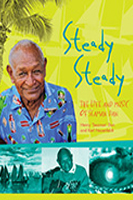Steady Steady: The life and music of Seaman Dan
Henry ‘Seaman’ Dan and Karl Neuenfeldt - Steady Steady from AIATSIS on Vimeo.
Includes free CD of Seaman Dan's favourite songs including new recordings of signature tunes.
Summary
Born on Thursday Island in 1929, Seaman Dan didn’t release his debut album, ‘Follow the Sun’, until his 70th birthday. In the next ten years he released five albums, showcasing traditional music from the Torres Strait, as well as those revealing his love of jazz and blues.
Steady steady: The life and music of Seaman Dan is replete with Uncle Seaman’s stories of his active and sometimes dangerous life in the islands in the heyday of pearl diving and other jobs, and his later development as a professional singer/musician.
The book includes many evocative and previously unknown images sourced from family and friends and will include a CD of tracks reflecting important periods in the life of this national treasure.
'I've been playing since I was eight years old. I'll just go to venues and sing a couple of songs, otherwise I'll just go stale, because I love music.'
Seaman Dan
Henry ‘Seaman’ Dan is not only one of Australia’s oldest active recording artists and performers, he is also one of its best-loved and well-regarded.
Karl Neuenfeldt is a music producer, researcher and performer. He has worked with Henry Seaman Dan for over a decade as co-producer and songwriter. He has co-produced more than thirty CDs of Australian Indigenous music in collaboration with northern Queensland Indigenous communities and artists. Trained academically in Cultural Studies (PhD) and Anthropology (MA), he has written extensively on music-based topics including the didjeridu and Torres Strait Islander and Aboriginal music.
- Listen to a sample of Seaman Dan’s songs
- See the launch at KickArts in Cairns
- Visit the Gondwana Children’s Choir
Reviews and endorsements
'We love the way he mixes the blues and Torres Strait music, especially that he also sings in traditional languages. Everyone loves Bala Seaman and his music. He’s a great ambassador for the Torres Strait because he brings together Indigenous and non-Indigenous people through his unique style of music.' Cessa Nakata and Ina Titasey, the Torres Strait Mills Sisters
'In earlier times the Darwin people of mixed-race Aboriginal descent were encouraged to identify with the ‘other’ side of their inheritance – Malay, Filipino, Chinese, whatever. As a result, culturally, they were somewhat lost. But they cherished their contacts with people from Torres Strait.
So when Seaman Dan came to Darwin in the early 1950s he was made very welcome. For one thing he was a beaut, good-looking bloke, musical, played nice guitar, knew all the ‘pearling’ songs and the marvellous traditional songs of Torres Strait.
His second big attribute was that he took a job at Koolpinyah Butchers and they also made ice. Very few people had refrigerators in those days and ‘The Ice Man’ was probably the most popular man in town. The many parties at 118 Parap Camp and the Police Paddock were enhanced by the arrival of Seaman: The Ice Man Cometh.
There was a group of us: Seaman, Rusty Perez, Steve Abala, Gabe Hazelbane, Peter Cardona and me. We would sing all night. And lower the odd beer!
Seaman represented ‘the genuine article’ to us in respect of the pearling industry. He was a ‘blue water’ man. He had practical experience as a diver and his arrival would usually prompt the cry: ‘Stand back you shallow water mob: make way for a deep sea diver’.
His musical career, his entire life since, has been nothing short of remarkable. Australia is indeed a lucky country.' Ted Egan, OAM
Apart from an inspiring story, however, this is a fund of information for the exploration of a range of more general issues: cultural diffusion and diaspora, social history, musical globalisation. But the cultural contextualisation flows naturally from the life experience of the singer…Here’s the nub: if you are interested in any of the above, buy this book! Bruce Johnson, Perfect Beat: the Pacific journal of research into contemporary music and popular culture
